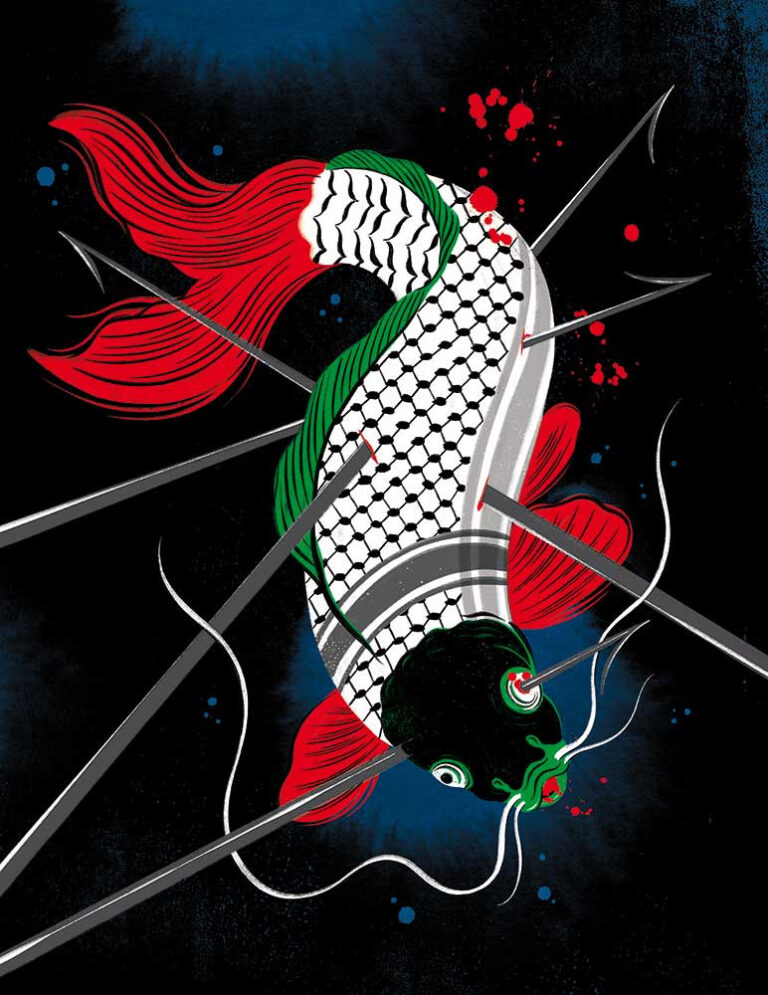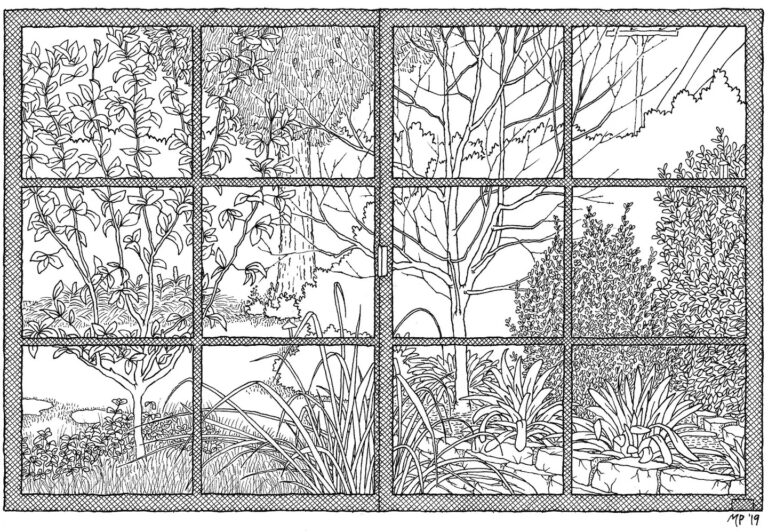Viet Thanh Nguyen explores the connection between the South Vietnamese flag, nationalism, and the radicalized nostalgia for a lost country for the Washington Post.

Among the American flags flying at President Trump’s rally last week, and then the march of his supporters toward the Capitol, was an anomaly: the flag of another country, one that no longer exists except in memory and the imagination, that of the Republic of Vietnam. The distinctive flag is bright yellow with three horizontal red stripes. Americans of the war generation may remember it. It was not a surprise to see the South Vietnamese flag at an attempted insurrection against American democracy, but still a disappointment. Liberal Vietnamese Americans who saw the flag at the rally groaned in recognition and condemned what they saw as its desecration, waving in the vicinity of the Confederate flag.
Why was this flag there? Why was it, the flag of another country, welcomed by the marchers, most of whom were White people who describe themselves as American patriots? Other national flags also flew, which speaks to their potent symbolism for ultranationalist people. But the South Vietnamese are particularly vocal about their love for Trump, and at this rally and other pro-Trump rallies, the South Vietnamese flag appears often. In America, white nationalists and Vietnamese nationalists share a common condition: a radicalized nostalgia for a lost country and a lost cause.
I recall the time I gave a speech at a South Carolina university a couple of years ago. I had never been to the state and only occasionally had visited the South, and usually to the big cities, so I admit to being a little worried about how my talk on the war in Vietnam and memory would go over. Yes, I have a stereotype about the South; unfortunately, the first person to ask a question — an older White man with an enormous, bushy beard — confirmed the stereotype. His question: “Do you know that we fought a war here and after we lost, we were occupied afterward too? We were victims, too, just like your people.”
He was referring to the two Souths: the American South and South Vietnam, where I was born. True, both had been defeated in civil wars. I suggested to him that while we both might have been victims in some sense, these wars had other victims, too, and in the case of Black people, their plight far outweighed what happened to White Southerners. Afterward he told me he was running for political office.
His perspective felt familiar, because I had grown up with its parallel in the Vietnamese refugee community, where people dwell on their victimization by their communist enemies. The fervor of that feeling means that they find it almost impossible to consider a world that is not divided neatly into a binary: us vs. them, anti-communist vs. communist, good vs. evil, victim vs. victimizer. In such a worldview, reconciliation with the enemy is not possible. The past cannot be forgotten. The war is not over. The battle might yet be renewed, and next time, won. The possibility that their moral purity might be questioned — impossible.
The depth of anti-communist feeling in the Vietnamese community, which includes many military veterans and former government officials, meant that it has always leaned strongly Republican. While Asian Americans as a whole voted 2 to 1 for Joe Biden over Trump, Vietnamese Americans supported Trump over Biden, 57 percent to 41 percent. A deep animus toward China, amplified by misinformation in Vietnamese-language media, bolsters the support for a president they see as tougher on foreign policy. This dovetailed with their anticommunism.
For decades, many in the community harbored the belief that they would one day return to Vietnam to topple the communist regime, first through military struggle and then, as the veterans aged, through political struggle. The Vietnamese communist regime took that threat seriously. In the years after its triumph, the regime imprisoned tens of thousands of its former enemies, from generals and judges to enlisted men and priests. Unknown numbers died in the regime’s reeducation camps. Hundreds of thousands fled persecution by boat, and many lost their lives at sea. The regime effectively destroyed any possibility of resistance, suppressed the public memory of South Vietnam, destroyed its monuments and silenced most of its opposition. Dissidents still exist today, but they are imprisoned quickly and harshly. Consider, in contrast, what happened in the United States after its Civil War: Reconstruction lasted little more than a decade. Jim Crow and the Ku Klux Klan rose. The fable and romance of a noble White South took hold and was allowed to flourish.
Both approaches sought to move forward swiftly in the name of unity, but instead allowed disunity to fester. The Vietnamese communist model eliminated the subversion of its regime, but it didn’t eliminate resistance, which merely migrated via an embittered refugee diaspora. The American model, more generous to the defeated, simply led to an enduring resentment among a certain portion of the White population, partly attached to the South and its Lost Cause, partly attached to the maintenance of a besieged white supremacy. The lesson here is not that a more forceful punishment of Confederate soldiers would have prevented the rise of a Lost Cause mythology; punishment alone does not lead to an acceptance of defeat. What was lacking, in both cases, was genuine reconciliation.
Reconciliation is more than opposing sides agreeing to the end of a conflict or moving forward for the sake of economic progress. Reconciliation of the moral, historical and political kind would require all sides to acknowledge what they have done and whom they have harmed. From there, forgiveness can be extended and programs of repair can be administered, from reparations to commemoration. But while all sides during a war commit atrocities, it is not true that all sides are equally culpable, or that all atrocities are the same. The inability of some Americans to acknowledge that the Civil War was fought for slavery and that slavery is an atrocity for which this country has still not properly atoned symbolically or economically leads to a situation where they can construe themselves as victims — whether at the hands of the Union or by persecution today by the so-called politically correct elite.
Vietnam’s history of colonization and occupation by outside powers produces a murkier problem of who among the Vietnamese was on the right side of history. Still, reconciliation will remain impossible when the government refuses to allow for dissident voices, for southern perspectives on history and the war, and for an accounting of the regime’s abuses.
At the same time, the Vietnamese refugee community has to want to reconcile, too, which would mean recognizing the communist regime and some of the failures of the Republic of Vietnam. Instead, many in that community insist that there is only one way to understand the war, history and politics. This not only widens the divide between Vietnamese refugees and Vietnam, but between refugees and their children, many of whom reject the politics of Trump. That rift is severe, entangling the divisiveness of American politics today with the trauma of the war that brought them to the United States in the first place.
This trauma helps to account for the emotional susceptibility that brings many Vietnamese refugees in line with a powerful sentiment held by some Americans. When Trump calls his supporters “the forgotten men and women of our country” who “will be forgotten no longer,” and tells them that “everyone is listening to you now,” he may be speaking first to White people. But his words also resonate with many Vietnamese refugees who feel forgotten, and who dwell in — perhaps even enjoy — their resentment against those who have defeated them. So they wave their yellow flag, the symbol of their lost cause, and it is accepted by believers in other lost causes.
This is a kind of nostalgia, which literally means homesickness — and one can indeed die of the grief one feels for a lost home, as many an exile or refugee can attest. Nostalgia is usually harmless, except to the people who suffer from it. Unfortunately, the radicalized nostalgia of nationalists — mixed with resentment, the desire to avenge loss and the fantasy of attaining victory — has infected the entire body politic in the United States. The country has wavered between partially remembering the past and partially forgetting it, a half-measure that has made it vulnerable to its present schisms. As long as we postpone the work of reconciliation, we will remain tethered to our unhappy memories, unable to move forward.


